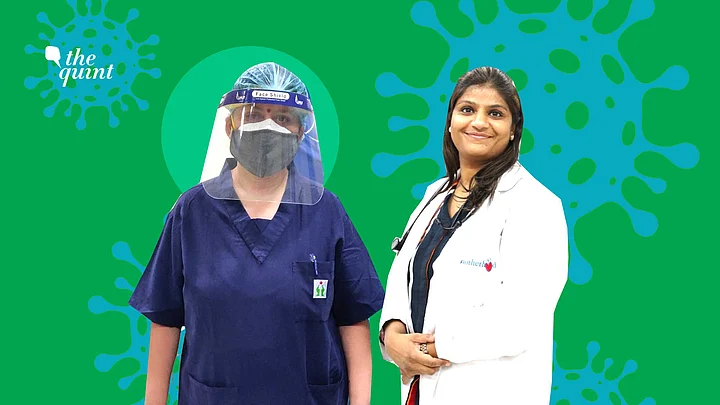India is said to have recorded the highest number of childbirths since COVID-19 was declared a pandemic in March 2020, according to the United Nations Children's Fund (UNICEF). More than 20 million babies were born in the latter half of the year alone. This number is only expected to go further up in 2021.
In such a scenario, how are gynaecologists faring in taking care of pregnant women? To put it succinctly, it's not been an easy ride.
For Bengaluru-based Dr S Jayashree, a gynaecologist with almost three decades of experience, the pandemic and the subsequent lockdowns forced her to change her approach towards taking care of her patients.
Before the pandemic, doctors say, a pregnant woman would visit a gynaecologist at least 12-14 times on an average during her pregnancy. But Dr Jayashree, like thousands of gynaecologists across India, had to divide the examination of her patients between physical visits for scans and tests and video calls via Zoom.
"People are generally more anxious when they are pregnant for the first time. The uncertainty of the pandemic has spiked this anxiety beyond imagination. Earlier, they would come straight to the hospital, get examined. But no matter how much they tele-consult, doctors and patients are going to be a little bit apprehensive," Dr Jayashree, who sees at least 25-30 pregnant women every day, tells The Quint.
'Adapted to Tele-Consults But Physical Examination the Most Important'
As per India's government norms, every pregnant woman should make at least four visits to her gynaecologist for consultation before she gives birth.
A usually non-emergency yet essential health service, prenatal care usually involves detailed physical and obstetric examinations. Therefore, non-availability of such resources can lead to delay in screening and diagnosis of preventable pregnancy-related health problems like anaemia, gestational diabetes, gestational hypertension, pre-eclampsia (a condition in pregnancy characterised by high blood pressure), foetal growth restriction/death, breast problems, among others.
During the COVID-19 pandemic, and especially during the second wave from March 2021, this access was cut down drastically – with lakhs of pregnant women missing their appointments over fear of catching the virus.

(Illustration by Arnica Kala/TheQuint)
Dr Manju Gupta, Senior Consultant Obstetrician & Gynaecologist at Motherhood Hospital tells The Quint:
"The fact remains that we cannot take them through pregnancy without physically examining them. It is only when we physically examine them that we can check for complications – if there is any caused by hypertension or diabetes or even post-COVID. We have cut down the visits from minimum 10 to at least five before the baby is born. Now, this varies from hospital to hospital."
She explained that a separate rostering system had to be put in place to ensure that the women were connected to the doctors on time, and a detailed schedule had to be made with regard to their physical examination dates.
"I had to unlearn a lot of things. Earlier, we used to ask our patients to come during this particular week and the patient would turn up. But now, it is different. We have to make a detailed timetable to decide when they should come on online calls, and the specific dates they should come for physical examination on. There is a lot of hospital-patient coordination involved. And, in case of emergency – we always need to have not just a Plan A but also Plan B and C, without even hinting our anxiety to the patient," she adds.
Dr Nupur Gupta, Director, Obstetrics and Genealogy, Fortis Memorial Research Institute in Gurgaon, says that women put their pregnancy on the back foot over the fear of contracting the virus, adding:
"We have been insisting and also educating that the scheduled clinical examination is extremely important even if there is fear of virus – even at the height of the second wave of COVID-19. Just sitting at home, we cannot ascertain whether the baby's and mother's weight is alright. We do not know if there is a blood pressure issue or diagnose the kidney and liver disorders on time."
The pandemic even forced pregnant persons to miss ultrasounds due to multiple reasons – either they did not have access to it, or they were in quarantine after coming in contact with an infected person or had tested positive themselves.
"So, many women have missed important tests like ultrasound at 14 weeks, which is the most important and looks for abnormalities. If something does seem different in later scans, they are no longer at the stage where they can terminate their pregnancy. Other women who had an unplanned pregnancy and wanted to terminate it could no longer do it as they had passed the time it is legally allowed in India," says Dr Nupur Gupta.
The doctors added that beyond a point their 'hands were tied' and there was nothing they could do to help the families who were expecting a child.

(Illustration by Arnica Kala/TheQuint)
'Online Consultations Left Behind Underprivileged Women'
Dr Jayashree points out that tele-consulting is the most viable option and continues to be used for regular check-ins, even as cases start to drop across the country. But it comes with privilege and excludes women with backward socio-economic status.
"We have to acknowledge that women from lower socio-economic backgrounds did not do tele-consulting. They were most affected because they were still coming to hospitals or not doing any consultations during pregnancy at all," she says.
According to a study by the University College for Medical Sciences, Delhi, the reorganisations of government hospitals for COVID patients and closure of routine prenatal OPDs have prevented pregnant persons to approach hospitals. It added that this has led to a decline in number of prenatal care registrations to approximately 80 percent in April-May 2020 as compared to the corresponding period in 2019.
"With many big government hospitals being re-designated as COVID hospitals, they had to take extra precautions if and when they visited. Lack of access to care during pregnancy is especially dangerous as it puts two lives at risk, even more when you add a pandemic to the mix," she says, adding that in many rural parts of the country women went back to giving births at home and not visiting the hospital at all.
What Happens When Their Patient Tests Positive?
According to a new study by the Indian Council of Medical Research (ICMR), the case fatality rate in pregnant and postpartum women was 5.7 percent in the second wave as opposed to just 0.75 percent in the first wave. The second wave has been nothing but a nightmare for not just pregnant women but also gynaecologists.
"During the first wave of pandemic, hardly five of my patients were infected with COVID-19. Barely anyone had severe symptoms. But in this wave, if I had 100 patients at a point of time – at least 30 were infected. The severity was across trimesters. You could not say first trimester was less severe than third. It was a nightmare. As a doctor, you want the best for the mother and baby,” Dr Manju Gupta tells The Quint.
In such instances when the mother tested positive and was taken to another hospital, the gynaecologists kept in touch with either her husband or parents. They would also get on calls with doctors who were seeing their patient in another hospital – provide case history, see how their treatment for COVID-19 would not in any way harm the pregnancy. If they were in home quarantine, they would need to send a message every day with their vitals to the gynaecologist.
"In one instance, a COVID-positive patient of mine had to go into emergency labour. I rushed to a COVID-only hospital and was there for her along with another gynaecologist from there. Despite our best efforts, we couldn't save the mother. I still wake up in the middle of the night, thinking about it," says Dr Jayashree.
"The initial days were depressing. Every phone call scars us – be it patients or family. We have been primed that way. Some days were really bad, when we see our patients helpless – fighting not just for one but two lives. I hope we never go back to those trying days again," Dr Gupta ends.
Now that COVID vaccination has been allowed for pregnant women, the situation may improve, but for those who are not privileged enough to have access to tele-consultations, things remain to look dismal.
(At The Quint, we question everything. Play an active role in shaping our journalism by becoming a member today.)



